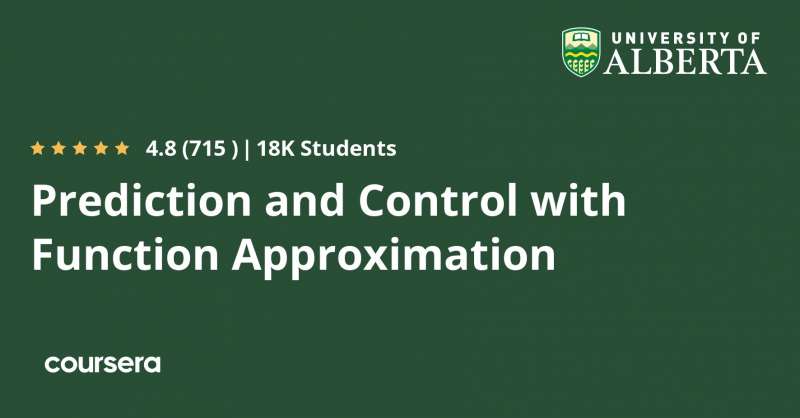Prediction and Control with Function Approximation
It is one of the best online approximation courses for anyone interested in learning more about approximation. You will learn how to tackle issues involving vast, high-dimensional, and potentially infinite state spaces in this course. You'll show how estimating value functions may be modeled as a supervised learning problem (function approximation), allowing you to create agents that carefully balance generalization and discrimination to maximize reward. They will start by looking at how policy assessment and prediction approaches, such as Monte Carlo and TD, may be used to function approximation. You'll learn about representation learning using neural networks and backprop, as well as feature creation approaches for RL.
They wrap off this session with a look at policy gradient techniques, which are a means of learning policies without having to memorize a value function. In this course, you'll solve two continuous-state control problems and learn about the advantages of policy gradient approaches in a continuous-action setting. Prerequisites: This course expands on the basics learned in Courses 1 and 2, and students should have finished those courses before beginning this one. Probabilities and expectations, basic linear algebra, basic calculus, Python 3.0 (at least 1 year), and implementing algorithms from pseudocode should all be familiar to students.
You will be able to do the following by the conclusion of this course: Understand how to estimate value functions using supervised learning algorithms; Understand the prediction (value estimate) objectives in the context of function approximation; Execute TD in an environment with an unlimited state space using function approximation (state aggregation) (continuous state space); Know how to build features using fixed basis and neural networks; Implement TD in a continuous state environment using neural network function approximation -Understand new challenges in exploration when transitioning to function approximation; Apply anticipated Sarsa and Q-learning with function approximation on a continuous state control challenge -Understand objectives for directly estimating policies -Contrast discounted problem formulations for control against an average reward problem formulation (policy gradient objectives); In a discrete state context, implement a policy gradient approach (dubbed Actor-Critic).
- Flexible deadlines: Reset deadlines based on your availability.
- Shareable certificate: Get a Certificate when you complete
- 100% online: Start now and learn at times that suit you.
- Course 3 of 4 in the: Reinforcement Learning Specialization
- Intermediate level: Probabilities & Expectations, basic linear algebra, basic calculus, Python 3.0 (at least 1 year), implementing algorithms from pseudocode.
- Approx. 10 p.m. to finish
- Subtitles: Arabic, French, Portuguese (European), Italian, Vietnamese, German, Russian, English, Spanish
SKILLS YOU WILL GAIN:
- Artificial Intelligence (AI)
- Machine-learning
- Reinforcement Learning
- Function Approximation
- Intelligent Systems
Rating: 4.8/5
Enroll here: coursera.org/learn/prediction-control-function-approximation













